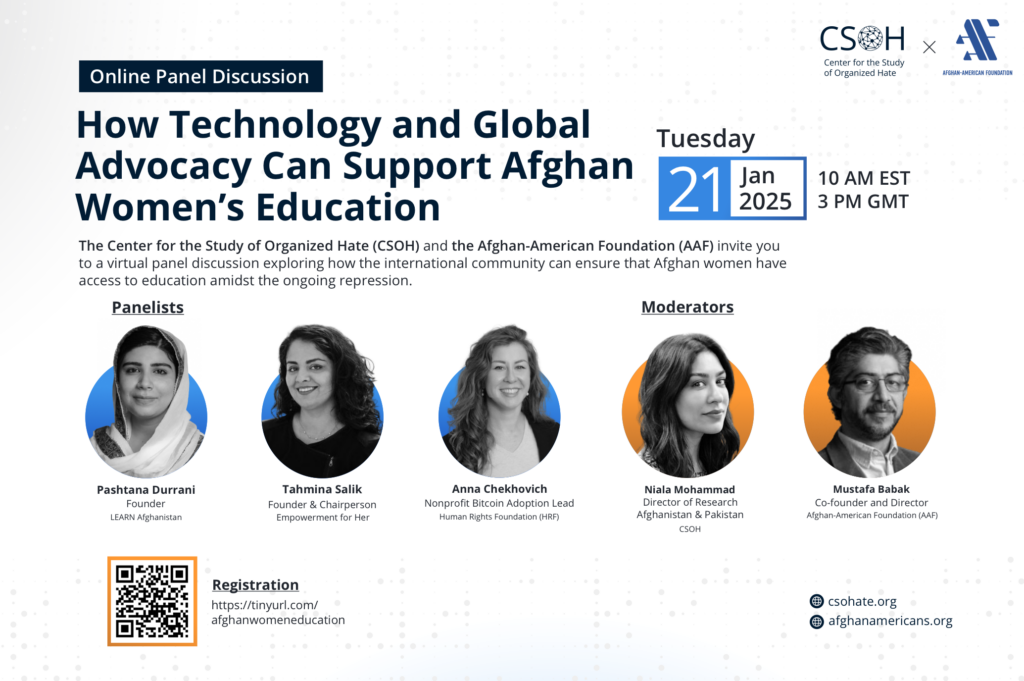The international community has a critical role to play in supporting Afghan women’s education amidst the ongoing assault on their fundamental rights. Shortly after seizing power, the Taliban closed secondary schools for girls, effectively denying them education beyond the age of twelve. Since then, the regime has issued over seventy edicts further restricting the rights of Afghan women and girls. These measures severely limit their access to education, employment, healthcare, travel, sports, and recreation, impacting all aspects of their lives.
More than 1.4 million Afghan girls have been intentionally deprived of an education. This highlights the urgent need for global action to advocate for and support the educational rights of Afghan girls, promoting both access to education and international solidarity.
The Center for the Study of Organized Hate (CSOH) and the Afghan-American Foundation (AAF) invite you to a virtual panel discussion exploring how the international community can ensure that Afghan women have access to education amidst the ongoing repression.
Panelists
Pashtana Durrani
Pashtana Durrani is an International Scholar-in-Residence at the Wellesley Centers for Women. She is an Afghan human rights activist and community development expert who focuses on girls’ education. While at WCW, she continues in her capacity as a practitioner to develop models that support Afghan women and girls pursuing education and the health of Afghan mothers and infants.
Durrani founded LEARN Afghanistan, a grassroots organization established to safely and securely educate girls through a distributed network of tablet computers using an offline platform. Through LEARN, she has educated 7,000 girls and boys in Kandahar, Afghanistan, and trained more than 80 teachers in digital literacy. LEARN also focuses on girls’ health and has trained 700 girls in menstrual hygiene management.
Pashtana, through LEARN, runs six underground secret schools in Kandahar, Helmand, Daikundi, Samangan, Herat, and Bamyan. These schools educate 700 girls daily.
Pashtana Durrani served as a global youth representative for Amnesty International from 2017 to 2019. In recognition of her exceptional efforts to improve education for Afghan girls, she was named an Education Champion by the Malala Fund in 2020. Durrani’s innovative approach to addressing complex global challenges earned her the 2021 Tällberg-SNF-Eliasson Emerging Leader Prize. She was also honored as one of the BBC’s 100 Influential Women in 2021 and participated in #Times100talks in 2022. A graduate of the New Voices Fellowship in 2022, Durrani received the UN Young Activists Award 2022. Her accolades include the CEU Open Society Prize in 2023, the Global Citizen Award for Human Rights in 2023, the Muhammad Ali Humanitarian Award in 2023, and the Women’s Excellence Award from the World Economic Forum in 2024. She was also awarded Ali Center’s Newest Daughters of Greatness in late 2024. Currently, she is pursuing her Master’s degree at Harvard University.
Tahmina Salik
Tahmina Salik is a dedicated women’s rights activist, advocate, and the founder and Executive Director of Empowerment for Her, an NGO committed to advancing women’s rights and empowerment globally. Born in Kabul, Afghanistan, and raised in Denmark, Tahmina combines her rich cultural heritage with a global perspective to address critical issues affecting Afghan women.
With a Master’s degree in International Relations from the University of Southern Denmark, Tahmina has worked extensively with activists, policymakers, and NGOs worldwide. Her advocacy focuses on gender equality, women’s empowerment, and the recognition of gender apartheid as an international crime.
Tahmina has been a lead advocate in meetings with the EU Parliament’s Human Rights Commission and participated in key discussions at the United Nations in Geneve to modernize international conventions addressing gender-based crimes.
In addition to her advocacy work, Tahmina has successfully led micro-business initiatives, establishing 50 businesses to empower Afghan women economically. Her leadership has inspired change both on the ground and in global policy discussions.
Passionate about creating lasting impact, Tahmina envisions a world where women’s rights are fully realized through knowledge-sharing, collaboration, and democratic representation. Her work remains a testament to resilience, courage, and unwavering commitment to justice and equality.
Anna Chekhovich
Anna Chekhovich is a member of the Financial Freedom team at the Human Rights Foundation (HRF), where she focuses on Bitcoin adoption strategies for activists and NGOs in authoritarian regimes. Her extensive finance background began at Alexei Navalny’s Anti-Corruption Foundation (ACF) in 2017, where she was pivotal during the presidential campaign and pioneered the use of Bitcoin to circumvent governmental surveillance in Russia. Since joining HRF in 2024, she has been instrumental in helping nonprofits integrate Bitcoin into their financial practices, ensuring they achieve autonomy and security against oppressive government interference.
Moderator
Niala Mohammad
Niala Mohammad serves as the Director of Research, Afghanistan and Pakistan at the Center for the Study of Organized Hate (CSOH). Previously, she held the role of Director of Policy and Strategy at the Muslim Public Affairs Council (MPAC) and served as a Senior Policy Analyst for South Asia at the U.S. Commission on International Religious Freedom (USCIRF). Before this role, she served for 14 plus years as a multimedia broadcast journalist with the Voice of America covering South Asia.
Mustafa Babak
Mustafa is an international development expert with over 17 years of multidisciplinary experience in public sector reform and governance, global health, policy research, and advocacy. Prior to moving to the US in 2011, Mustafa advised the Afghan and the U.S. governments and international partners on key development issues, including counter-narcotics, health, and local governance. As part of his global health work, Mustafa has worked with the World Bank and other partners to advance health systems reforms and security in Africa, South America, and Southeast Asia.
Mustafa has also been a leading voice for community empowerment and constituency building in the Afghan diaspora. This passion led him help establish the Afghan-American Foundation in 2020 as a national advocacy organization committed to advancing the voices of the Afghan-American diaspora, and earlier this year transitioned as its Director. Mustafa holds a BA from the University of the Pacific, and an MPA in Global Public Administration received jointly from New York University and the University College London.
